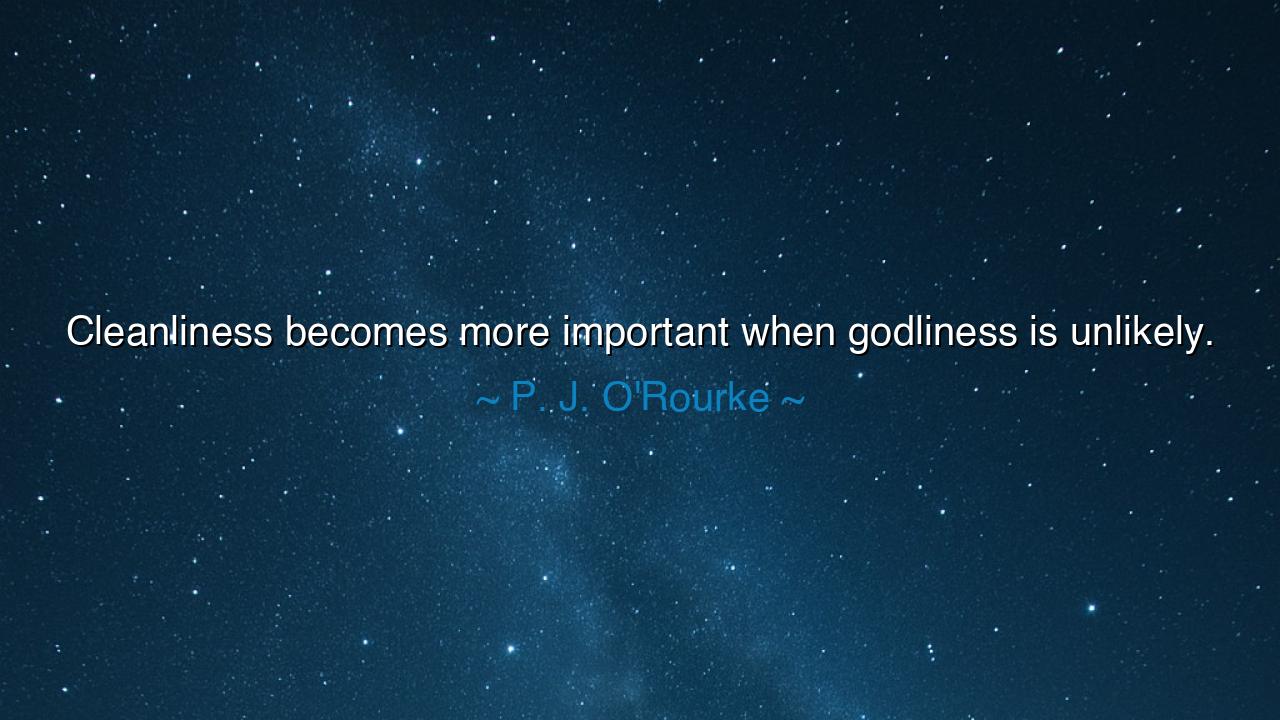
Cleanliness becomes more important when godliness is unlikely.






"Cleanliness becomes more important when godliness is unlikely." These words, spoken by P. J. O'Rourke, carry a profound irony and wisdom that speaks to the core of human existence and society. In this statement, O'Rourke acknowledges a harsh reality—when the pursuit of higher virtue or spirituality seems distant, unattainable, or even improbable, the mundane aspects of life, such as cleanliness, take on an unexpectedly significant role. It is a reminder that even in the absence of divine grace or godliness, there are still practical virtues that can provide order, structure, and dignity in life.
In the ancient world, the pursuit of purity—both physical and spiritual—was central to many cultures. The Greeks, for example, believed that cleanliness was an outward reflection of inner discipline and self-control. Plato, in his writings, often linked physical cleanliness with a pure soul. The Romans, too, established elaborate public baths, emphasizing the importance of keeping the body clean as part of maintaining a well-ordered society. For them, cleanliness was not just a practical necessity but a moral imperative—an outward sign of inner virtue. Yet, O'Rourke’s words suggest that when the pursuit of godliness feels like a far-off ideal, the simple act of cleanliness can still offer structure and a sense of dignity in our lives.
Consider, too, the example of Diogenes, the ancient Greek philosopher who famously lived in a barrel and rejected many of the social conventions of his time. Diogenes preached the virtues of self-sufficiency and simplicity, often through bold actions that challenged the status quo. His lifestyle was considered extreme, even though cleanliness was not a central part of his personal philosophy. Yet, in an age where spiritual and moral truths were often interpreted by social elites, Diogenes’s rejection of social status and embrace of basic living served as a reminder that the simple acts of life—like cleanliness—held their own form of virtue, especially in times when higher ideals seemed elusive.
In more recent history, Mahatma Gandhi offers a striking example of how cleanliness can symbolize deeper principles. While Gandhi’s life was guided by the pursuit of truth and spiritual enlightenment, he also emphasized the importance of cleanliness in daily life. He believed that personal cleanliness—whether it was through his daily rituals of bathing or his efforts to keep the streets clean—was an outward expression of inner discipline and respect for life. Gandhi’s emphasis on cleanliness was rooted in the belief that we can’t aspire to higher truths if we neglect the simple duties of daily life. For him, maintaining cleanliness was an act of self-purification, which created a foundation upon which higher virtues could be built.
O'Rourke’s statement, while humorous, underscores an essential point: in the face of an imperfect or chaotic world, we must still find ways to bring order to our lives. Cleanliness, as simple as it may seem, is one of the most accessible means of doing so. It offers a structure when other, more idealized pursuits—such as godliness—seem distant or out of reach. In a world filled with distractions, frustrations, and imperfection, we must recognize the value of small, tangible actions that bring clarity and order to our world. Cleanliness, then, becomes a form of rebellion against chaos, a way to restore dignity in a world that often feels out of control.
The lesson from O'Rourke’s words is clear: even if we cannot immediately access higher virtues, we should strive to maintain the simpler, more tangible virtues that help us anchor ourselves. Cleanliness, as both a practical and symbolic act, gives us a means of asserting some semblance of control over our environment. By tending to our physical surroundings, we may find that we are also tending to our inner selves, creating the conditions for a deeper, more meaningful pursuit of spirituality and purpose. In this way, cleanliness becomes a foundation—one that may help us rise above the mundane and move toward the higher goals that O'Rourke suggests are out of reach.
In our own lives, let us not underestimate the power of simple, everyday acts. Even when godliness or spiritual fulfillment seem distant, we can take comfort in the small, practical steps—like keeping our homes in order, our bodies clean, or our environments organized. These actions may seem insignificant, but they represent the first step toward greater discipline, peace, and ultimately, the virtues we seek to embody. As we move forward, let us embrace the small acts of virtue, understanding that they may serve as stepping stones to the higher goals we wish to achieve. Through cleanliness, we may find the foundation upon which all other virtues are built.






AAdministratorAdministrator
Welcome, honored guests. Please leave a comment, we will respond soon